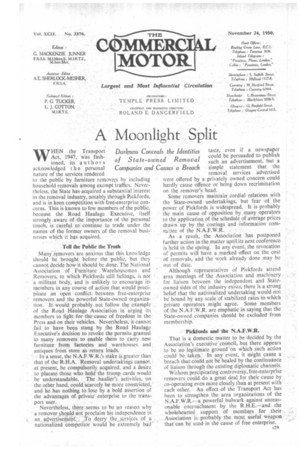A Moonlight Split
Page 31

If you've noticed an error in this article please click here to report it so we can fix it.
WHEN . the Transport Act, 1947, was fash ioned, its authors acknowledged t he personal nature of the services rendered to the public by furniture removers by including household removals among exempt traffics. Nevertheless, the State has--acquired a substantial interest in the removal industry, notably through Pickfords, and is in keen competition with free-enterprise concerns. This is known to few members of the public, because the Road Haulage Executive, itself strongly aware of the importance of the personal touch, is careful to continue to trade under the names of the forma owners of the removal businesses which it has acquired.
Tell the-Public the Truth Many removers are anxious that this knowledge should be brought before the public, but they cannot decide how it should be done. The National Association of Furniture Warehousemen and Removers, to which Pickfords still belOngs, is not a militant body, and is unlikely to encourage its members in any course of action that would precipitate an open conflict between free-enterprise removers and the powerful State-owned nrganization. it, would probably not follow the example of the Road Haulage Association in urging its members to fight ,for the Tattse of freedom in the • Press and on their vehicles. Nevertheless, it cannot fail to have been stung by the Road Haulage Executive's decision to revoke the permits granted to many removers to enable them to carry new furniture from factories and warehouses and antiques from store as return loads.
• In a sense, the N.A.F.W.R.'S stake is.greater than that of the R.H.A. Removal undertakings cannot,: at present, be compulsorily acquired, and a desire , to placate those who hold the trump cards would be understandable. The haulier's activities, on the other hand, could scarcely be more constricted, and he has nothing to lose by a bold assertion of the advantages of private' enterprise to the transport user.
Nevertheless, there .seems to •be no reason why a remover should not proclaim his independence in an advertisement. , To decry the„„sTervices of a nationalized competitor would be extremely bid taste, even if a newspaper could be persuaded to publish such an advertisement, but a simple statement that the removal services advertised were offered by a privately owned concern could hardly cause offence or bring down recrimination on the remover's head.
Some removers maintain cordial relations with the State-owned undertakings, but fear of the power of Pickfords is widespread. It is probably the main cause of opposition by many operators to the application of the schedule of av'erage prices drawn up by the costin:gs and information cornre..ittee of the N.A.F.W.R. , As a result, the Association has postponed further action in the matter untii.its next conference is held in the spring. In any event, the revocation of permits will have a marked effect on the cost of removals, and the work already done may be out of date. '
Although representatives of Pickfords attend area meetings of the Association and machinery for liaison between the independent and Stateowned sides of the industry exists, there is a strong belief that the nationalized undertaking would not be bound by any scale of stabilized rates to which private operators might agree. Some members of the N.A.F.W.R. are emphatic in saying that the State-owned companies should be excluded from membership Pickfords and the N.A.F.W.R.
That is a domestic matter to be decided by the Association's executive council, but there appears to be no legitimate ground on which such action could be taken. In any event, it might cause a breach that could not be healed by the continuance of liaison through the existing diplomatic channels. Without precipitating controversy, free-enterprise removers could do a great deal for their cause by co-operating even more closely than at present with each other. An effect of the Transport Act has been to strengthen the area organizations of the N.A.F.W.R.—a powerful bulwark against unreasonable encroachment by the R.H.E.—and the wholehearted support of members for their Association is. probably the most useful weapon that can be used in the cause of free enterprise.




























































































